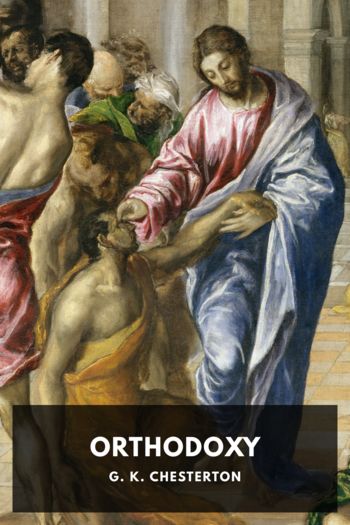Heretics - G. K. Chesterton (novels to improve english TXT) 📗

- Author: G. K. Chesterton
Book online «Heretics - G. K. Chesterton (novels to improve english TXT) 📗». Author G. K. Chesterton
One enormous obstacle stands in the way of its actuality. The men who write it, and the men who read it, are men of the middle classes or the upper classes; at least, of those who are loosely termed the educated classes. Hence, the fact that it is the life as the refined man sees it proves that it cannot be the life as the unrefined man lives it. Rich men write stories about poor men, and describe them as speaking with a coarse, or heavy, or husky enunciation. But if poor men wrote novels about you or me they would describe us as speaking with some absurd shrill and affected voice, such as we only hear from a duchess in a three-act farce. The slum novelist gains his whole effect by the fact that some detail is strange to the reader; but that detail by the nature of the case cannot be strange in itself. It cannot be strange to the soul which he is professing to study. The slum novelist gains his effects by describing the same grey mist as draping the dingy factory and the dingy tavern. But to the man he is supposed to be studying there must be exactly the same difference between the factory and the tavern that there is to a middle-class man between a late night at the office and a supper at Pagani’s. The slum novelist is content with pointing out that to the eye of his particular class a pickaxe looks dirty and a pewter pot looks dirty. But the man he is supposed to be studying sees the difference between them exactly as a clerk sees the difference between a ledger and an edition de luxe. The chiaroscuro of the life is inevitably lost; for to us the highlights and the shadows are a light grey. But the highlights and the shadows are not a light grey in that life any more than in any other. The kind of man who could really express the pleasures of the poor would be also the kind of man who could share them. In short, these books are not a record of the psychology of poverty. They are a record of the psychology of wealth and culture when brought in contact with poverty. They are not a description of the state of the slums. They are only a very dark and dreadful description of the state of the slummers. One might give innumerable examples of the essentially unsympathetic and unpopular quality of these realistic writers. But perhaps the simplest and most obvious example with which we could conclude is the mere fact that these writers are realistic. The poor have many other vices, but, at least, they are never realistic. The poor are melodramatic and romantic in grain; the poor all believe in high moral platitudes and copybook maxims; probably this is the ultimate meaning of the great saying, “Blessed are the poor.” Blessed are the poor, for they are always making life, or trying to make life like an Adelphi play. Some innocent educationalists and philanthropists (for even philanthropists can be innocent) have expressed a grave astonishment that the masses prefer shilling shockers to scientific treatises and melodramas to problem plays. The reason is very simple. The realistic story is certainly more artistic than the melodramatic story. If what you desire is deft handling, delicate proportions, a unit of artistic atmosphere, the realistic story has a full advantage over the melodrama. In everything that is light and bright and ornamental the realistic story has a full advantage over the melodrama. But, at least, the melodrama has one indisputable advantage over the realistic story. The melodrama is much more like





Comments (0)